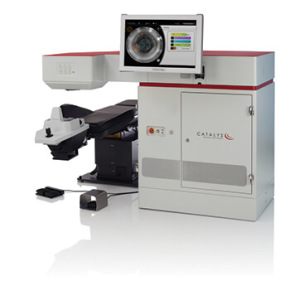Laser Cataract Surgery: Is it Safe and Effective?
June 7th, 2016
The number of cataract surgeries performed in the United States each year nears 1.5 million, and is expected to grow in the coming years. Further analysis of this data revealed that one in three Americans over the age of 60 will undergo cataract surgery. While cataract surgery is clearly one of the most common outpatient eye procedures performed today, many of our patients still have reservations when it comes to undergoing the procedure. Dr. Danny Lee, a leading cataract surgeon in the Huntsville area, is passionate about the safety and efficacy of modern laser cataract surgery. So, what exactly makes it so safe? And does it really work as well as ophthalmologists tell you?
The Era of Laser Cataract Removal
Cataract surgery has actually been around for a lot longer than you might think. The first successful cataract surgery was performed in 1747. Before then, dating back to ancient times, a technique called “couching” was used. Cataract surgery has come a very long way since then. While traditional cataract surgery is still performed more often around the world, laser cataract surgery is quickly becoming the standard in cataract treatment, especially in countries such as the United States.
Laser cataract surgery is the preferred method of cataract removal among patients and ophthalmologists alike. There are a few reasons for this. For patients, laser cataract surgery is more comforting to them than traditional cataract surgery, which uses a blade. But, aside from it being less daunting, what actually makes the use of a laser safer or more effective?
As the name would suggest, laser cataract surgery uses a laser in place of the blade used in traditional cataract surgery. This laser, called a femtosecond laser, emits a cool beam of light to create a precise corneal incision. This laser also helps to soften and break up the cataract, making removal easier for the surgeon and easier on the eye. Because of the use of a computerized laser, there is little to no possibility for error in incision making, and results are precise and tailored to each individual eye. In this way, laser cataract surgery is much more effective than traditional cataract surgery.
CATALYS® advanced 3D imaging technology allows Dr. Lee in Huntsville to create a three-dimensional map of the eye, allowing him to completely tailor each surgery to each patient. Because of the extreme accuracy that comes along with the addition of the CATALYS® imaging machine, there is little to no possibility of error during surgery. This allows for much higher levels of safety than traditional cataract surgery.
Advantages of Laser Cataract Surgery
Here are the top three advantages of laser cataract surgery:
Less Cell Damage
There is less eye manipulation in laser cataract surgery. This means less endothelial cells (corneal cells) being damaged. Endothelial cells can’t be replaced. Less cell loss means future corrective surgeries can still be done to accommodate vision problems brought on by aging.
More Precise Techniques
During laser cataract surgery, the incisions are precisely tailored to each eye. This means more customized to each eye, allowing for the best results possible. These results are more difficult to achieve through traditional cataract surgery which requires a blade.
Less Ultrasound Use
Laser cataract surgery uses 45% less ultrasound, meaning that it uses less energy and fewer movements inside of the eye.As a result, there is less risk of developing complications such as swelling and inflammation. Healing is also generally faster with laser cataract surgery.
Laser cataract surgery is generally safer, more precise and much faster than traditional cataract surgery. If you are searching for a skilled, highly trained cataract surgeon in Alabama, Dr. Lee located in Huntsville may be right for you! Call today for your cataract surgery consultation or just to set up an appointment with Dr. Lee!



